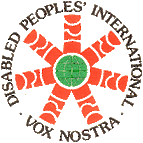Disabled Peoples' International - Europe
Including People with Disabilities in Disaster Preparedness and Response
Results and analyse of the brief survey made by DPI EuropeWhat it is?
Article 11 of the CRPD states that “States Parties shall take, in accordance with their obligations under international law, including international humanitarian law and international human rights law, all necessary measures to ensure the protection and safety of persons with disabilities in situations of risk, including situations of armed conflict, humanitarian emergencies and the occurrence of natural disasters.”
The Committee of Permanent Correspondents of EUR-OPA and UNISDR very well received the job engaged by the Council of Europe to Include People with Disabilities in Disaster Preparedness and Response. He then placed the work on people with disabilities in the context of the EUR-OPA pluri-annual work program on vulnerable groups, which will, in 2014, also highlight the issue of migrants, refugees and asylum seekers related to disaster risk reduction.
DPI Europe has joint the meeting of the Committee of Permanent Correspondents on the inclusion of people with disabilities in disaster preparedness and response at its 64th meeting held in Paris, France, on 24-25 October 2013. A series of six recommendations to the Committee of Ministers for information and possible distribution to all member States of the Council of Europe were adopted at this meeting. It was decided to organize an international conference in 2014, probably in December in Brussels.
With that objective, a Working Group was set up and a first workshop was held in Paris on January 15th 2014 and a second one took place in London on March 13th. It must be noted here that the 3rd World Conference on Disaster Risk Reduction will be hold on 14-18 March 2015, in Sendai, Japan.
How to participate?
Participation of People with disabilities to this process is by fact essential, and is based on your expertise and experiences to enrich the recommendations.
Situations of risks and their origins are numerous and can have a lot of different consequences, natural like earthquakes, tsunamis, fires, typhoons … or not, like wars, explosions, fires, car accidents…, and people with disabilities have many different needs and resources, limitations and potentials. They can live in their home or in institutions, they can be young, adult or old, educated or not, moving in a wheelchair or with canes, communicating with oral words or with signs …
The first debate disabled people must clarify is about their vulnerability. Some of us feeling them vulnerable and other refuse this term arguing that their vulnerability is not linked with their capacities but with the environment. Disasters change people’s environment and raise barriers for a large number of the population,and your positionon this issueis welcomed.
DPI Europe Action Plan 2014/15 on Disaster Preparedness and Response
Objectives
1.Include people with disabilities as experts at all the levels, adopt and engage an action plan to make all the activities initiated for disaster risk reduction buildings, functioning and services accessible to all whatever his or her capabilities.
2. Train people with disabilities as trainers on risk management.
3.Include training sessions on risk management in the rehabilitation processes.
4. Make the reconstruction processes inclusive and accessible with reference to the Convention on the Rights of Persons with Disabilities (CRPD).
The core of the process is to identify
1.
People who need special supports in case of emergency situation.
2.
Vital materials for people with disabilities (Medicines, Technical aids …).
3.
Volunteers with disabilities capable to share their knowledge as trainers and experts.
DPI members are encouraged to
take some of the following concrete actions:
•Contact the national co-ordination group on risk management from your country.
•Identify people with disabilities ready to share their experience of disaster preparedness and/or having being victim of a disaster.
•Elaborate training sessions to include in the education processes of professionals for incident, crisis and disaster management and response.
•Answer the questionnaire and/or propose items that seem significant.
•
Submit a written contribution on personal experiences and/or recommendations
18 mars 2015
